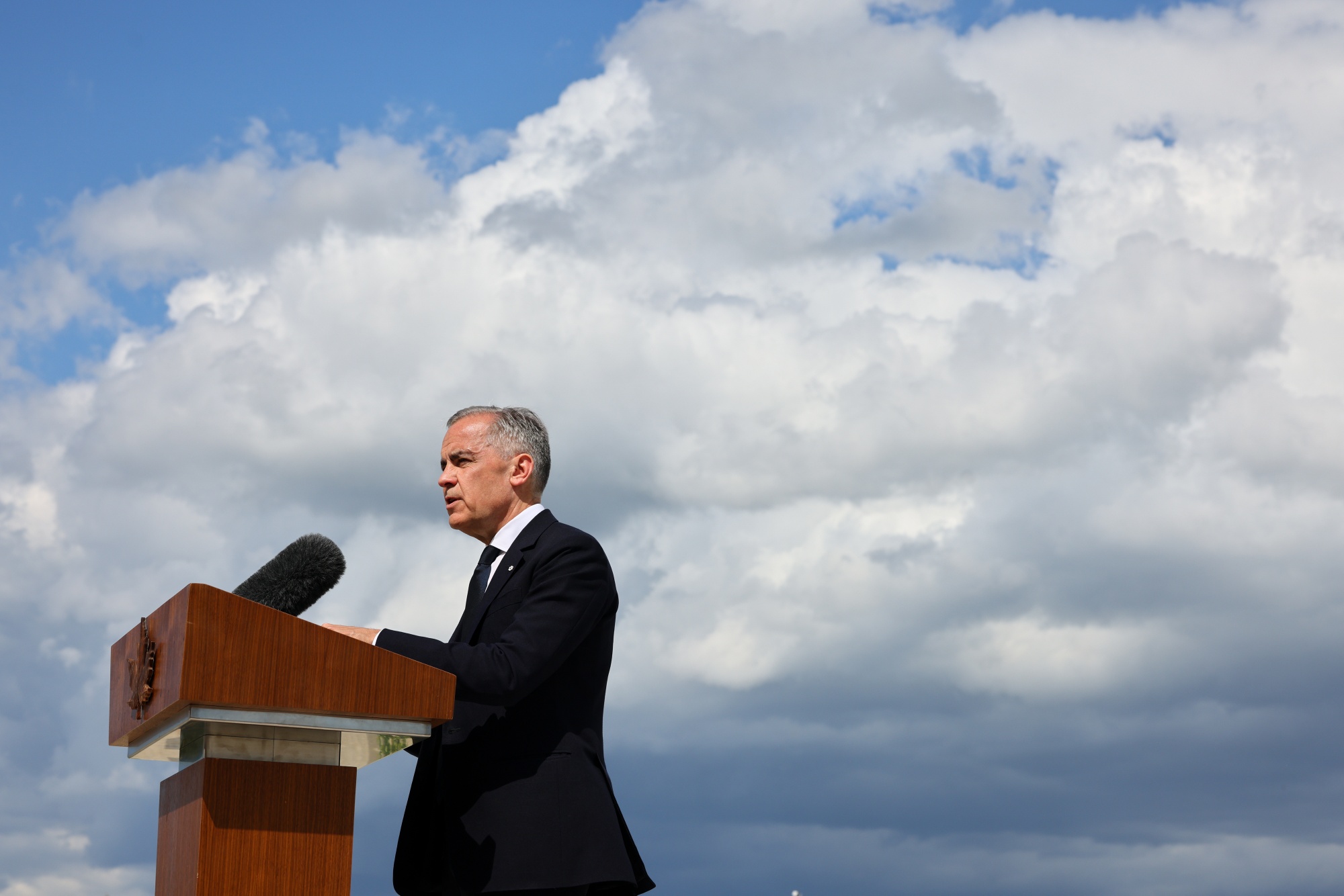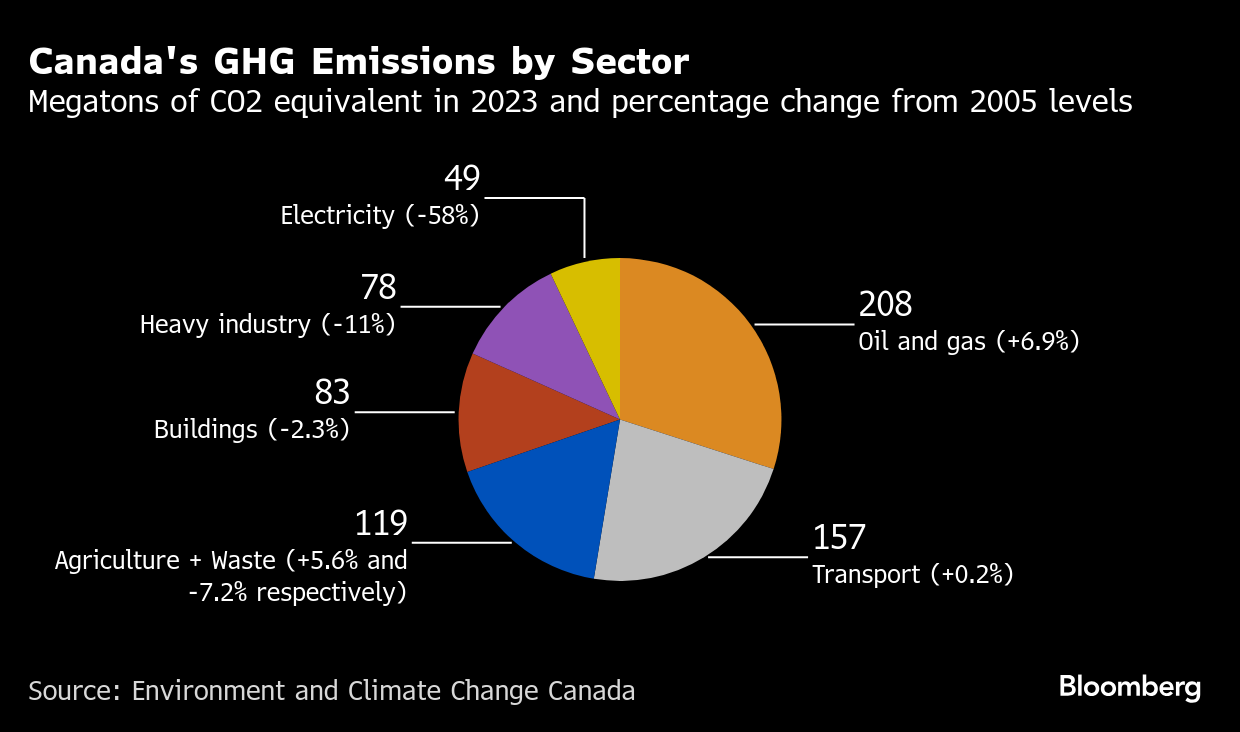‘I’m the Same Me’: Canada’s Mark Carney Defends His Climate Record
(Bloomberg) -- Canadian Prime Minister Mark Carney said he’s focused on climate policies likely to have the greatest impact at a time of strained resources and multiple crises, denying criticisms that he’s backpedaling on actions to protect the environment.
“What we need to do is to be as effective as possible, in terms of addressing climate change while growing our economy,” he said during a wide-ranging podcast interview for Bloomberg Weekend’s

Despite deep green credentials — including a five-year stint as United Nations special envoy for climate change — Carney has scrapped a number of environmental policies introduced by his predecessor, Justin Trudeau, and struck a notably friendlier tone on fossil fuel production. He’s fast-tracked approval for a liquefied natural gas export facility expansion in British Columbia, opened the door to the possibility of a new oil pipeline to the country’s west coast, and hasn’t ruled out abandoning plans for an emissions cap for oil and gas producers.
Pressed on his plans for the cap, Carney repeatedly responded that “a desired outcome” — in this case emissions reduction — “is not a policy.”
“What makes those emissions go down will be carbon capture and storage,” he said. The former central banker has previously said carbon capture could be part of a “grand bargain” with the province of Alberta that would allow it to increase its fossil fuel exports via a new oil pipeline.
Carney swept to power earlier this year on a tide of national fear created by US President Donald Trump’s tariffs and oft-stated desire to acquire Canada. Since then, Trump has been dismantling American green policies at a fast and furious rate, recently telling world leaders that climate change is a “hoax” and “the greatest con job ever perpetrated on the world.”
The president’s return, and Republican pressure, have hastened a climate retreat in some quarters outside the US: earlier this month, for example, a global banking alliance that Carney helped found in 2021 shut down after losing most of its membership — including all of Canada’s biggest banks.
While Carney has taken a contrary position to Trump on some issues, notably on the matter of a Palestinian state, he has been publicly silent on Trump’s climate change denialism. Privately, he floated the idea of reviving the controversial Keystone XL oil pipeline project to the US president in a recent face-to-face meeting.
All of this has reinforced the pre-election concerns of some who feared he’d be forced to compromise on climate to tackle more pressing issues.
“All of the indicators are that he’s doubling down on fossil fuels, which is bad for the climate, it’s bad for the Canadian economy, and he should know better because he knows the climate science,” said Jessica Green, political scientist at the University of Toronto and author of a recent book
There’s no doubt the prime minister is in a difficult position, needing to avoid antagonizing Trump while reinvigorating Canada’s economy in the short-term. But his need to “make nice” with the US president would be more credible if it were accompanied with stronger policies to help the country decarbonize in the long-term, Green said.
In September, research by the Canadian Climate Institute concluded that Canada won’t make its 2030 emissions reductions target under the Paris Agreement because of recent weakening of federal and provincial climate policies.

On his first day in office, Carney scrapped Canada’s consumer carbon tax and has since paused a program that would have required automakers to ensure at least a fifth of their sales were zero-emission vehicles by next year.
The carbon tax was deeply divisive and, had it not been scrapped, would have resulted in the election of a Conservative government “that would have canceled all climate policies in effect,” Carney said in the interview. His Liberal Party has a minority in Parliament.
He added his government is spending almost twice as much on clean energy as conventional oil and gas, and is trying to end methane flaring, a massive contributor to global warming.
Given that the world is still going to be using oil in 2050 — the year Canada has a legally required commitment to reach net zero emissions — it makes sense to position the country to produce oil with the lowest carbon footprint, he said. (Emissions from such oil would still contribute to global warming when burned, unless Canada’s customers also captured the carbon.)
Asked if he’s in danger of squandering his reputation as a global climate champion, Carney told Husain that being prime minister is not about reputation but about doing what’s in the best interests of Canada.
“The question is: how do you make progress toward those issues? And particularly how do you make progress in a way that is most effective?” he said.
“I’m the same me. I’m focused on the same issues.”
©2025 Bloomberg L.P.




